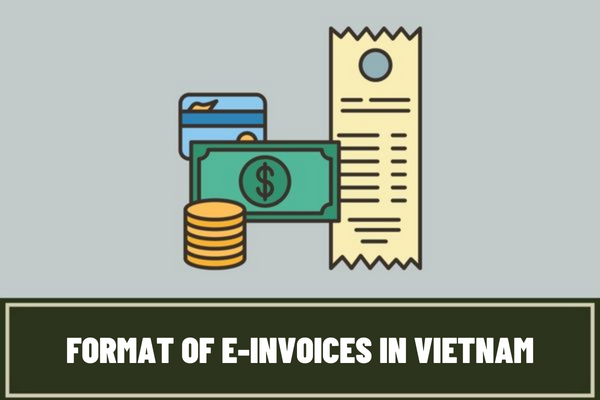Is the contract formatted like an electronic invoice in Vietnam? What are the contents of invoices in Vietnam?
What are electronic invoices and electronic records according to the law?
Pursuant to Clause 2, Article 3 of Decree No. 123/2020/ND-CP, “e-invoice” means an invoice, with or without the tax authority’s authentication code, in the form of electronic data, issued by the goods seller or service provider by using electronic instruments to record information on the sale of goods or service provision in accordance with regulations of the Law on accounting and the Law on taxation, including the invoices generated by POS cash registers that are digitally connected to tax authorities. To be specific:
- “authenticated e-invoice” means an e-invoice that is granted an authentication code by the tax authority before it is sent to the buyer by the goods seller or service provider.
The authentication code on an e-invoice is a unique serial number generated by the tax authority’s system and a series of characters encoded by the tax authority based on the information specified by the seller on the invoice.
- “unauthenticated e-invoice” means an e-invoice that is sent to the buyer by the goods seller or service provider without the tax authority’s authentication code.
Clause 1, Article 17 of the 2015 Law on Accounting in Vietnam provides for electronic documents as follows:
- Electronic records are considered accounting records if they have the contents specified in Article 16 of the 2015 Law on Accounting in Vietnam and are displayed in the form of electronic data, encrypted and not changed during transmission through the computer network or telecommunications network or by a storage device such as magnetic tape, magnetic disc, or payment cards.

Is the contract formatted like an electronic invoice in Vietnam? What are the contents of invoices in Vietnam?
Is the contract formatted like an electronic invoice in Vietnam?
According to the provisions of Article 12 of Decree No. 123/2020/ND-CP on the format of e-invoices as follows:
E-invoice format
1. The e-invoice format is the technical standards for type of data, length of data of information fields serving transmission, storage and display of e-invoices. E-invoices shall be XML (extensible Markup Language) documents, which are meant to share electronic data between IT systems.
2. The data of an electronic invoice consists of two components: information about the transaction and the digital signature. Authenticated e-invoices shall also contain the data of the tax authority’s code.
3. The General Department of Taxation shall develop and announce the format of transaction-related information, digital signatures and tools for display of e-invoices prescribed herein.
4. The following requirements must be met when sellers directly transmit data to tax authorities:
a) Connect to the General Department of Taxation via a separate channel or MPLS VPN Layer 3, including 1 main channel and 1 backup channel. Each channel has a minimum bandwidth of 5 Mbps.
b) Use an encrypted Web Service or Message Queue (MQ) for connection.
c) Use Simple Object Access Protocol (SOAP) to compile, transmit and receive data.
5. Contents of e-invoices shall be fully and accurately displayed, ensure readers can read them with electronic devices.
Thus, the e-invoice format is the technical standards for type of data, length of data of information fields serving transmission, storage and display of e-invoices. E-invoices shall be XML (extensible Markup Language) documents, which are meant to share electronic data between IT systems.
- The data of an electronic invoice consists two components:
Information about the transaction and the digital signature.
Authenticated e-invoices shall also contain the data of the tax authority’s code.
In addition, the Official Dispatch No. 4038/CTHN-TTHT in 2023 instructs the same case as follows:
...The electronic invoice format uses the XML document format language and must be displayed fully and accurately the contents of the invoice as prescribed in Article 12 of Decree No. 123/2020/ND-CP
For electronic document formats: Contracts, Debt Notices that are not under the jurisdiction of tax authorities...
Thus, according to the definition of e-invoices and e-documents, the contract is represented in the form of encrypted electronic data and used for transactions, so the contract is not an electronic invoice format.
What are the contents of invoices in Vietnam?
Pursuant to Article 10 of Decree No. 123/2020/ND-CP stipulating the contents of invoices in Vietnam as follows:
- Name, reference number and form number of the invoice. To be specific:
+ The invoice name shall comply with the provisions in Article 8 hereof. For instance: VAT invoice, VAT invoice cum tax refund declaration, VAT invoice cum receipt, sales invoice, public property sales invoice, stamp, ticket, card, and sales invoice on national reserve goods.
+ Form number and reference number of the invoice shall comply with regulations of the Ministry of Finance.
- Names of copies of tax authority-ordered printed invoices shall comply with regulations of the Ministry of Finance.
- Invoice number
- The seller’s name, address and TIN
- The buyer’s name, address and TIN
- The name, unit, quantity, unit price, amount payable exclusive of VAT, VAT rate, total VAT amount calculated by each VAT rate, total VAT payable and total amount payable inclusive of VAT
- Signatures of the buyer and the seller
- The issuance date of the invoice shall comply with the provisions in Article 9 hereof and be written in "ngày, tháng, năm” (day/month/year) format of the calendar year.
- The date of the digital signature on an e-invoice
- The tax authority’s authentication codes on authenticated e-invoices shall comply with the provisions in Clause 2 Article 3 hereof.
- Fees and charges payable to state budget, discounts and sales promotions (if any) shall comply with the provisions in Point e Clause 6 of this Article and relevant contents (if any).
- Name and TIN of the invoice printing service provider shall be specified in tax authority-ordered printed invoices.
- Text, numbers and currencies on invoices
- Other contents of invoices such as logos, brands, trademarks or photos of the seller.
LawNet